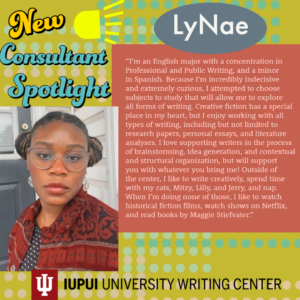Spotlighting New Consultants in The Center: LyNae
The beginning of the semester is always energizing and full of opportunities – especially when that semester is the Spring semester. We begin to shake off the affects of seasonal depression, warm weather is only a few months away, and we get to meet new people who may become a huge part of our academic and personal lives. These experiences also include the student employees and faculty that we work with daily to make college a little less chaotic. So, in the spirit of Spring semester, we would like to introduce our new writing center consultants and encourage the community to engage with and welcome them into the space!
We’ll be featuring a different new consultant in each post this week. Up first, we’d like to introduce LyNae!

What inspired you to work at the University Writing Center?
LyNae: During my second semester at IUPUI, both Dr. Brooks-Gillies and previous consultant Cory suggested that I apply to work in the University Writing Center. As a transfer student that largely commuted, I wasn’t aware of all the different programming at IUPUI. I didn’t apply then because I took a gap year right after. However, the intention to work in University Writing Center inspired me to stick with my plan and re-enroll in school. I love that the center embraces linguistic diversity and works from an anti-racist and decolonial rhetorical standpoint.
What are some aspects of the center that you wish you knew before you started working here?
LyNae: Hmm. This is a tough question. I’ll be honest and say there aren’t many aspects that I wish I knew more about. I believe that the introduction W397/597 Writing Center Theory & Practice class does a great job at immersing us in the center and practicing consulting. I’m a huge believer in the idea that there’s always more to learn. If anything, I’m excited to learn more about the different aspects of the center!
What are you most excited about in your work at the center?
LyNae: I’m excited about several things that will come with working in the center. Mostly, I’m excited to participate in research. Over the past year, I’ve had a growing interest in anti-racist and decolonial rhetoric, specifically in regard to linguistic and cultural diversity, multi-modal rhetoric, and composition studies. I’m also super excited to get to sit down with a variety of writers and discuss topics that are important to them!
What is one common misconception about the writing process that you want others to know about?
LyNae: There is no such thing as a linear writing process. Sure, there are different structures that someone can follow, but in general, the writing process is personal and no one person will write the same. For example, many people write their thesis first, but I write mine last because that’s what makes sense to me.
If you could be one type of frog, what would it be and why?
LyNae: Hands down, I’d be a mimic poison frog. Mimic poison frogs are beautiful and vibrant in color. They’re able to adapt and blend in with their environments, depending on whether they’re hiding from predators or looking for prey. For the most part, these frogs mind their own business, hopping about and eating their insect meals. They’re admirable little creatures, but just don’t touch them.

